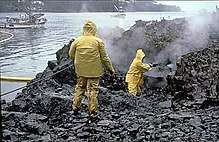Sustainability reporting
Sustainability reporting is not just report generation from collected data; instead it is a method to internalize and improve an organization’s commitment to sustainable development in a way that can be demonstrated to both internal and external stakeholders.
History
Corporate sustainability reporting has a history going back to environmental reporting. The first environmental reports were published in the late 1980s by companies in the chemical industry which had serious image problems. The other group of early reporters was a group of committed small and medium-sized businesses with very advanced environmental management systems. Additionally, the tobacco industry adopted such reporting much earlier than the rest of the corporate world, in an attempt to attract new investors at a time when ethical investing was becoming increasingly popular.
Non-financial reporting, such as sustainability and CSR reporting, is a fairly recent trend which has expanded over the last twenty years. Many companies now produce an annual sustainability report and there are a wide array of ratings and standards around. There are a variety of reasons that companies choose to produce these reports, but at their core they are intended to be "vessels of transparency and accountability." Often they also intended to improve internal processes, engage stakeholders and persuade investors.[1]
An issue in sustainability reporting is whether and how much data related to environmental, social and corporate governance practices and impacts must be disclosed.
As a matter of law, in the United States, the materiality principles controls whether a publicly traded corporation must disclose certain information, that is: “a fact is material if there is a substantial likelihood that the . . . fact would have been viewed by a reasonable investor as having significantly altered the ‘total mix’ of information available.”[2]
In this case, some authors have examined and applied several factors (including the percentages of managed investment assets that are screened for ESG criteria, plus the fact that over 90% of large publicly traded companies publish ESG data) and concluded that ESG data qualifies as being material.[3] It has also been suggested that other organizations that issue securities may also be well-advised to also engage in sustainability reporting.[4]
Initiatives
Organizations can improve their sustainability performance by measuring (EthicalQuote (CEQ)), monitoring and reporting on it, helping them have a positive impact on society, the economy, and a sustainable future. The key drivers for the quality of sustainability reports are the guidelines of the Global Reporting Initiative (GRI),[5] (ACCA) award schemes or rankings. The GRI Sustainability Reporting Guidelines enable all organizations worldwide to assess their sustainability performance and disclose the results in a similar way to financial reporting.[6] The largest database of corporate sustainability reports can be found on the website of the United Nations Global Compact initiative.
See also
References
Notes
- Rosie Bristow for the Guardian Professional Network. "Online discussion: sustainability reporting | Guardian Sustainable Business". theguardian.com. Retrieved 2014-08-27.
- "TSC Industries, Inc. v. Northway, Inc., 426 U.S. 438, 449 (1976)".
- Adam, Sulkowski; Waddock, Sandra. "Beyond Sustainability Reporting: Integrated Reporting Is Practiced, Required & More Would Be Better". University of St. Thomas Law Review. 10: 1060–1123 – via ResearchGate.
- Sulkowski, Adam (2016). "City Sustainability Reporting: An Emerging and Desirable Legal Necessity". Pace Environmental Law Review. 33: 278–299 – via Research Gate.
- Archived April 25, 2011, at the Wayback Machine
Further reading
- Schaltegger, S.; Bennett, M. & Burritt, R., eds. (2006). Sustainability Accounting and Reporting. Dordrecht: Springer.
External links
- 360report Glossary Definitions of terms concerning sustainability reporting
- GRI Reports List - Global Reporting Initiative Reports List (1999 - current). GRI's mission is to make sustainability reporting standard practice by providing guidance and support to organizations.
- The International Integrated Reporting Council (IIRC) A global coalition of regulators, investors, companies, standard setters, the accounting profession and NGOs. The coalition is promoting communication about value creation as the next step in the evolution of corporate reporting.
- Non-Financial Reporting and CSR Resource Centre is focused on the topic of environmental / sustainability / social reporting and provides fully descriptive links which are in its international section listed in 30 categories.
